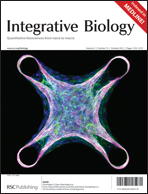Effects of shear stress on germ lineage specification of embryonic stem cells†
Abstract
Mechanobiology to date has focused on differentiated cells or progenitors, yet the effects of mechanical forces on early differentiation of pluripotent stem cells are still largely unknown. To study the effects of cellular deformation, we utilize a fluid flow bioreactor to apply steady laminar shear stress to mouse embryonic stem cells (ESCs) cultured on a two dimensional surface. Shear stress was found to affect pluripotency, as well as germ specification to the mesodermal, endodermal, and ectodermal lineages, as indicated by gene expression of OCT4, T-BRACHY, AFP, and NES, respectively. The ectodermal and mesodermal response to shear stress was dependent on stress magnitude (ranging from 1.5 to 15 dynes cm−2). Furthermore, increasing the duration from one to four days resulted in a sustained increase in T-BRACHY and a marked suppression of AFP. These changes in differentiation occurred concurrently with the activation of Wnt and


 Please wait while we load your content...
Please wait while we load your content...